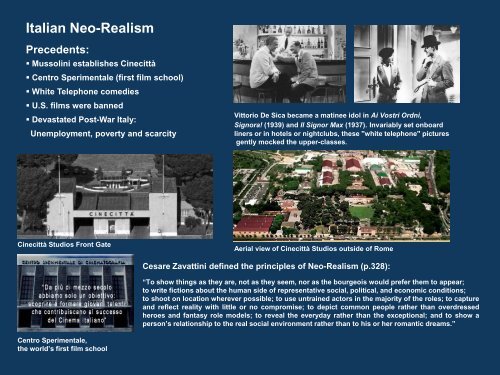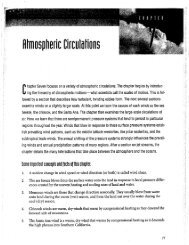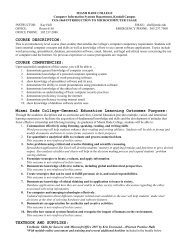FIL 1030 History of Film - MDC Faculty Home Pages
FIL 1030 History of Film - MDC Faculty Home Pages
FIL 1030 History of Film - MDC Faculty Home Pages
Create successful ePaper yourself
Turn your PDF publications into a flip-book with our unique Google optimized e-Paper software.
Italian Neo-Realism<br />
Precedents:<br />
Mussolini establishes Cinecittà<br />
Centro Sperimentale (first film school)<br />
White Telephone comedies<br />
U.S. films were banned<br />
Devastated Post-War Italy:<br />
Unemployment, poverty and scarcity<br />
Cinecittà Studios Front Gate<br />
Centro Sperimentale,<br />
the world’s first film school<br />
Vittorio De Sica became a matinee idol in Ai Vostri Ordni,<br />
Signora! (1939) and Il Signor Max (1937). Invariably set onboard<br />
liners or in hotels or nightclubs, these "white telephone" pictures<br />
gently mocked the upper-classes.<br />
Aerial view <strong>of</strong> Cinecittà Studios outside <strong>of</strong> Rome<br />
Cesare Zavattini defined the principles <strong>of</strong> Neo-Realism (p.328):<br />
“To show things as they are, not as they seem, nor as the bourgeois would prefer them to appear;<br />
to write fictions about the human side <strong>of</strong> representative social, political, and economic conditions;<br />
to shoot on location wherever possible; to use untrained actors in the majority <strong>of</strong> the roles; to capture<br />
and reflect reality with little or no compromise; to depict common people rather than overdressed<br />
heroes and fantasy role models; to reveal the everyday rather than the exceptional; and to show a<br />
person’s relationship to the real social environment rather than to his or her romantic dreams.”













